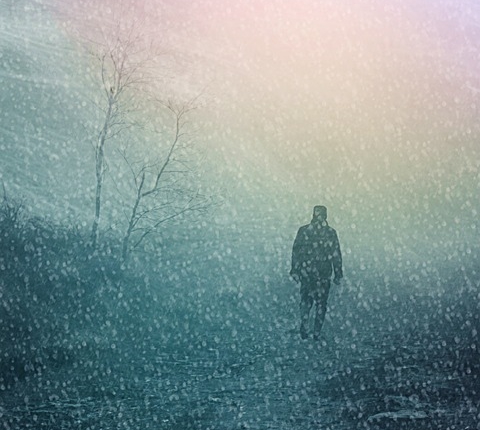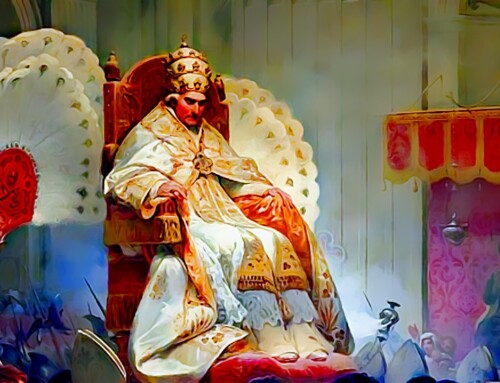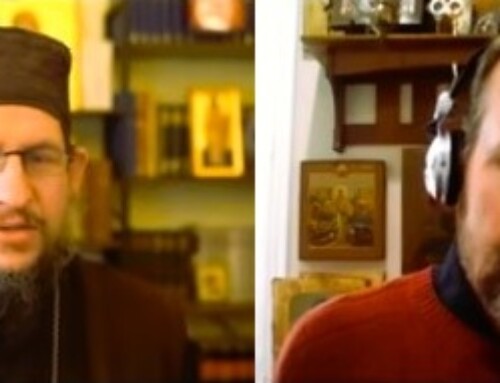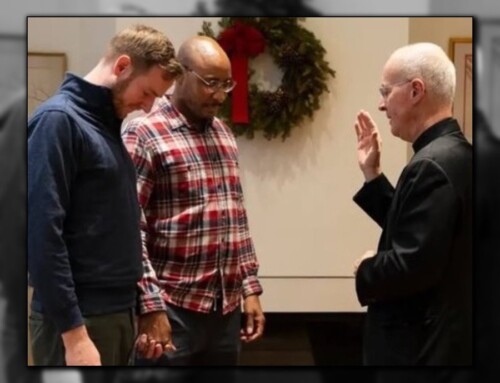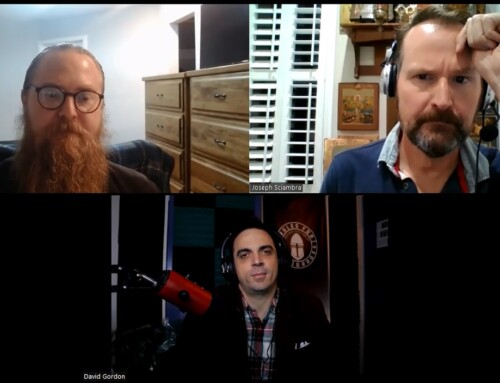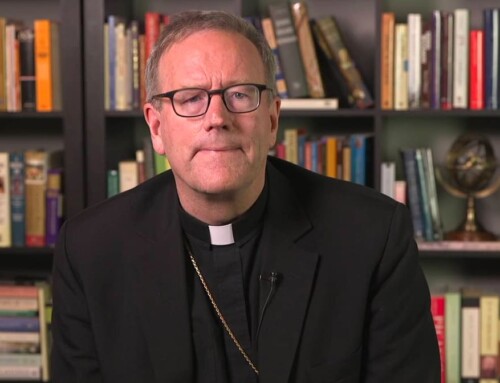Be of good courage; God will be present, as we now feel, to us who seek, who promises a certain most blessed body after this, and an utter plenitude of Truth without any falsehood. – St. Augustine
When I first “re”-discovered Catholicism, after a faulty upbringing in the Faith as a child of the 1970s, and after abandoning all semblance of Christianity for almost a decade, I came back to the Church as a heavily battered and wounded refugee of the sexual revolution. For years, I sought solace and the answer to all my questions among gay men. I immediately found approval and comradery at the festivals, parades, and gay bars of San Francisco. Yet, that perceived freedom only brought about enslavement and a deepening sense of loss that always seemed to grow from within. Nonetheless, I kept trying to make things work: going from one partner to another – believing that the next one would make everything else go away, tripping from the New Age to the occult, plunging further into perversity – feeling the pain slip away if only for a few brief moments. Hoping against hope, as I had nowhere left to turn – I inexplicably opened “The Catechism of the Catholic Church.” I read: “Homosexual persons are called to chastity.” I thought to myself: “Okay…that’s fine with me.” “I am tired and over-sexed anyway.”
At first, staying chaste was easy – I never even masturbated. Sexual thoughts were often ephemeral and short-lived. Although, I was continuously racked with guilt, unable to accept forgiveness from the Father, strangely enough – temptations of the flesh were a thing of the past. Only, I was not at peace. I hated what I did, and I detested myself for doing those things; I could not understand why I went so far astray; why I had fallen so far and so fast. I returned to the Sacraments. But I actively desired to know why my life had been filled with such turmoil; surfing the internet – I found the Courage apostolate; first, I read Fr. John Harvey’s “The Truth About Homosexuality;” often heavily citing studies performed by other researchers and authors – the majority of the lengthy chapters delved into the “why” of homosexuality. At about the same time, I also came across “A Parent’s Guide to Preventing Homosexuality” by Dr. Joseph Nicolosi. Both works were a revelation; I started to know the truth about myself: the tragic failures in my upbringing, the abuse I had no control over, and my hapless way of dealing with it all. I had always been in search of the truth – I just didn’t know where to find – and had no one to guide me. I got lost. St. Theresa Benedicta of the Cross wrote: “Whoever seeks the truth is seeking God, whether consciously or unconsciously.”
Second, I attended a Courage “meeting” in San Francisco. I had not returned to the City in several months, before arriving at the Golden Gate Bridge, I pulled my car over to the side of the road so I could vomit. Even though the fear slowly dissipated, I still felt anxious about going back to where I buried once beloved friends and almost lost my own soul. At the Cathedral, where the meeting took place, I found a small room reserved for Courage; windowless and cramped – it all felt slightly clandestine. Regardless, I was happy to know that the Church offered something for those that survived being gay.
I intermittently attended Courage meetings for a couple of years; mainly to go to Confession – as the priest was kind and soft-spoken; in addition, after several encounters with unashamedly pro-gay priests – it was a welcome relief to find a Confessor and spiritual adviser who actually upheld the teachings of the Church with regards to homosexuality. As for the group meetings: at first, I found them remarkable as I discovered that others shared my earnest desire to permanently escape the grip of homosexuality and the constant tormenting need to find fulfillment through other men. Their stories were heart-wrenching, but often unresolved. Increasingly, I viewed this practice as unnecessarily tiresome and unproductive. For, a majority of the time concentrated on personal weekly reports, usually concerning a recent “fall.” As most of the men lived within San Francisco – reminiscences often centered around the temptations of living in the Castro, partaking in “gay” functions while trying to remain chaste, and periodic relapses back into sexual activity with other men. Often, this scenario of recidivism and return to Courage for Confession appeared frequently in several members. By now, I cared deeply for them – and understandably began to worry. Having never gone back to gay sex, I had little to openly share – so, I usually hung back, but always listened with a keen interest. Infused with the knowledge gleaned from the books by both Fr. Harvey and, most importantly by Dr. Nicolosi, I longed to ask the inevitable question: Why.” Why do you continually feel drawn to gay sex, or why are you attracted to this type of man, or to that particular sex act; why do you keep going back? With “cross-talk,” or interjecting, strictly forbidden, by the time everyone got their turn and we’d gone around the circle – it was almost time to go home. To me, everything appeared unanswered. There was a forced sort of chastity, but I rarely saw healing – and, I seldom saw joy. As I continued to attend the meetings, I drew less and less from them, and I had even less to offer. Despite my growing lack of interest: I still cherished Courage as it offered Hope – that you weren’t alone, and that someone cared. But, after a meeting, I was often overcome by loneliness. Then without thinking about it – I stopped going.
Outside of Courage, I formed intense chaste friendships with a few of the other members; oftentimes, we would meet at each other’s homes, have dinner, pray the Rosary, and then inevitably talk about our ongoing struggles. But, unlike the Courage meetings – we spent most of our time discussing what got us here: the unresolved issues with our fathers, our continuing and troublesome obsession with porn, finding comfort and relief in masturbation. Some dug deep, and made themselves incredibly vulnerable; occasionally to the point of tears. There was encouragement and admissions of similar circumstances experienced by almost everyone; there were even hugs of friendship that further drew our little band of believers together. By talking about it – and finally admitting it: many made peace with the past, forgave those who wounded them, and moved on. We went beyond Courage, but still appreciating the apostolate for its fidelity to Church teaching while accepting its limitations.
In addition, from about 1999 to 2002, I participated in a Courage online support chatroom. The room was open for a couple of hours one night a week. Now that I stopped making the trip into San Francisco to attend the in-person meetings, this was about my only means of regularly connecting with other men suffering from unwanted same-sex attraction. Depending on the night, there would be between 15 and 20 guys in the chatroom. Topics ranged from the insignificant to the incredibly profound. Some merely wanted to share their current struggles, while others (usually me) put forth larger questions concerning the origins of their own homosexuality and how that related to their current efforts. Some wanted to partake in these bigger questions – others did not. Then, what made the chatroom wonderful was the ability to break off and personally message someone which enabled a one-on-one conversation. Looking back, those times spent hashing through much of my emotional baggage, with another man, someone I hardly knew, were about the most important moments in my recovery: the certain anonymity of the internet, the ability to reach a wider cross section of men from different backgrounds and ages, and the ease of a non-restricted conversation, enabled me to unburden myself for the first time in my life – in many respects, telling my story, and then hearing that another man lived almost the same plot-line, made it all seem less oppressively substantial.
On my own accord, with the help of a few knowledgeable and infinitely patient priests and Catholic therapists, I delved deeper into memories of my own childhood; often horrendously painful, I remembered things I had long buried within my subconscious. Far from inconsequential trials that every boy goes through – these were pivotal moments in my life that unfortunately set up my future swerve into homosexuality: a particular boy who mercilessly teased me – that would later transform into the image of the dominant sexualized male; the sexual abuse by an older man – that later became fetishized; and the horrific porn images I saw as a boy – that would later serve as a blue-print for my own sexual perversity. In every case, that which I was attracted to as an adult homosexual male had its roots in some childhood trauma. Then, I understood the source of my mis-wired emotions. According to Aleksandr Solzhenitsyn: “In keeping silent about evil, in burying it so deep within us that no sign of it appears on the surface, we are implanting it, and it will rise up a thousand fold in the future.”
Gradually, because I knew from where they emerged, those old fears and anxieties no longer controlled me. They had lost their power. They had been unmasked and I was freed; free from ever repenting them again; as I no longer needed to find male companionship and acceptance, that which I never received as a child, by having sex with other men; I no longer needed to make sense out of abuse by repeating it, trying to take pleasure from it, while making-believe that it wasn’t that bad; and I no longer needed the little bits of escape afforded by a brief slip into pornography. Through the Grace of Our Lord Jesus Christ – I am free.
